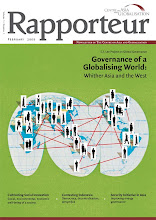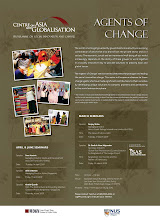 Professor Phua Kai Hong, Associate Professor of Health Policy and Management at the Lee Kuan Yew School of Public Policy recently attended a workshop organised by WHO Regional Office in Manila to discuss the setting up of an Asian Observatory on Health Systems. According to Dr Phua, the WHO Regional Director, Dr Shigeru Omi who visited the School a few months ago is keen to involve LKYSPP to be part of a regional consortium for comparative health systems studies. Here is the background of the meeting:
Professor Phua Kai Hong, Associate Professor of Health Policy and Management at the Lee Kuan Yew School of Public Policy recently attended a workshop organised by WHO Regional Office in Manila to discuss the setting up of an Asian Observatory on Health Systems. According to Dr Phua, the WHO Regional Director, Dr Shigeru Omi who visited the School a few months ago is keen to involve LKYSPP to be part of a regional consortium for comparative health systems studies. Here is the background of the meeting:Progress in improving health outcomes, achieving the health related Millennium Development Goals, and reaching universal access to health services as expressed by the slogan 'Health for All' from the Declaration of Alma-Ata on Primary Health Care is unacceptably slow in many countries.
Weak health systems have been identified as one of the main obstacles to improving health and scaling up effective health interventions This is so even when the funding situation for health has improved. Although reasons for weak health systems vary from country to country, the common ones include inadequate human and financial resources and their inefficient use; lack of coordination and inefficient management; financial, social and geographical barriers limiting access to essential health care; and inadequate information and evidence for policy- and decision-making.
Health systems are part of the fabric of societal and civic life. The core values and principles of the Declaration of Alma-Ata on Primary Health Care promulgated in 1978 are still relevant, even in today's globalized world. There is increased awareness of health inequities and the damaging effects they have on individuals and society. Evidence suggests that health systems oriented towards primary health care (PHC) are more likely to deliver better health outcomes, more equitable health outcomes, and greater public satisfaction at lower costs.
To guide its work in responding to these global challenges, the WHO Secretariat has produced the document Everybody's Business: Strengthening Health Systems to Improve Health Outcomes-WHO's Framework for Action. Building on Everybody's Business, which was developed in Geneva, the WHO Regional Office in the Western Pacific has developed a Strategic Plan for Strengthening Health Systems in the WHO Western Pacific Region.
The regional strategic plan is aimed at improving the WHO response to the health systems challenges and needs of its Member States. A meeting of experts to obtain perspectives and inputs on how to strengthen health systems in the context of the core values and principles in PHC was convened in Manila from 5 to 6 August 2008.
In addition to dealing with the core issues and activities in the regional Strategic Plan, the meeting also further elaborated the concept of a health systems observatory for the region. The need for better collection, analysis, and use of information on health systems is a recurring theme within the region that the WHO Regional Office for the Western Pacific feels the need to address. [Sung]










No comments:
Post a Comment